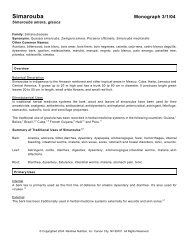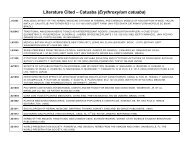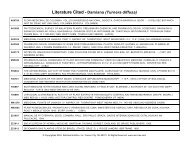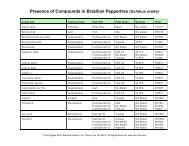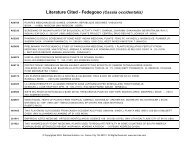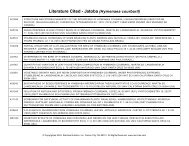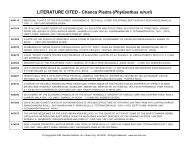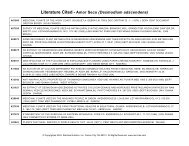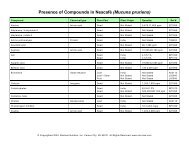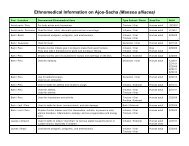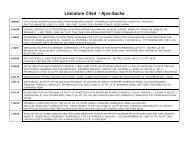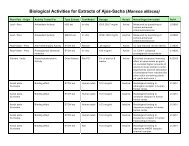Organ Specific Guide - Raintree Nutrition, Inc
Organ Specific Guide - Raintree Nutrition, Inc
Organ Specific Guide - Raintree Nutrition, Inc
Create successful ePaper yourself
Turn your PDF publications into a flip-book with our unique Google optimized e-Paper software.
ANAMU CAPSULES<br />
Description: Many biologically active compounds have been discovered in anamu, including flavonoids,<br />
triterpenes, steroids, and sulfur compounds. Anamu contains a specific sulfur compound named dibenzyl<br />
trisulfide which has been documented with anticancerous actions. Anamu also contains the phytochemicals<br />
astilbin, benzaldehyde, and coumarin, all three of which have been documented with antitumorous and/or<br />
anticancerous properties as well.<br />
Traditional uses by organ or system: Immune/Lymphatic System: For immune disorders (to stimulate<br />
immune function and immune cell production) and for cancer and leukemia.<br />
Ingredients: 100% pure anamu whole herb (Petiveria alliacea).<br />
Suggested Use: Take 2 capsules 2-3 times daily.<br />
Contraindications:<br />
• Methanol extracts of anamu were reported to cause uterine contractions in animals studies, therefore,<br />
it is contraindicated in pregnancy.<br />
Drug Interactions: None published. However, due to anamu's natural coumarin content, it is conceivable<br />
that it may potentiate the effects of coumadin (Warfarin®).<br />
Other Practitioner Observations and Possible Precautions:<br />
• Anamu contains a low concentration of coumarin, which has a blood thinning effect. People with blood<br />
disorders such as hemophilia should be monitored more closely for this possible effect.<br />
• This plant has been shown to have hypoglycemic effects in mice. People with hypoglycemia should be<br />
monitored more closely for this possible effect.<br />
Synopsis of research: (Please the online Tropical Plant Database for Anamu for all cited research.)<br />
Anamu has been found in both in vivo and in vitro studies to be an immunostimulant. In a 1993 study<br />
with mice, a water extract stimulated immune cell production (lymphocytes and Interleukin II). In the same<br />
year, another study with mice demonstrated that anamu increased natural killer cell activity by 100% and<br />
stimulated the production of even more types of immune cells (Interferon, Interleukin II, and Interleukin 4).<br />
Additional research from 1997 to 2001 further substantiated anamu's immunostimulant actions in humans<br />
and animals. In one study they reported: “Based on these findings we suggest that P. alliacea [anamu] upregulates<br />
anti-bacterial immune response by enhancing both Th1 function and the activity of NK cells.”<br />
Additional research published on anamu (and its plant chemicals) reveals that it has antileukemic,<br />
antitumorous, and anticancerous activities against several types of cancer cells. In an in vitro study by<br />
Italian researchers in 1990, water extracts and ethanol extracts of anamu retarded the growth of leukemia<br />
cells and several other strains of cancerous tumor cells. Three years later, they reported anamu was<br />
directly cytotoxic to leukemia and lymphoma cancer cells but only inhibited the growth of breast cancer<br />
cells. A study published in 2002 documented an in vitro toxic effect against a liver cancer cell line; another<br />
in vitro study in 2001 reported that anamu retarded the growth of brain cancer cells.<br />
Other research suggests anamu's traditional use as a remedy for arthritis and rheumatism has been<br />
validated by documenting analgesic, antinociceptive, and anti-inflammatory properties. One research group<br />
in Sweden reported that anamu possesses COX-1 inhibitory actions. Another research group in Brazil<br />
documented significant anti-inflammatory effects in rats using various models, and researchers in 2002<br />
noted a significant analgesic effect in rats. The analgesic and anti-inflammatory effects were even verified<br />
when an ethanol extract was applied topically in rats, again validating traditional uses.<br />
Many in vitro laboratory studies document that anamu shows broad-spectrum antimicrobial properties<br />
against numerous strains of bacteria, mycobacteria, mycoplasma, viruses, fungi, and yeast.



